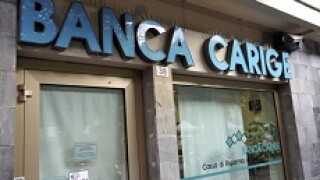Redemption
-
Banco BPM split opinion with a debut additional tier one bond this week, paying up to issue but proving that there’s a chance for the middle tier of Italy to access the market. The bank joined only two other Italians in having sold deals in the asset class — the national champion banks Intesa Sanpaolo and UniCredit, writes David Freitas.
-
Banco BPM hit the euro market on Thursday with its first additional tier one (AT1), becoming only the third Italian bank to sell a deal in the asset class following national champions Intesa Sanpaolo and UniCredit.
-
Yorkshire Building Society on Wednesday went to market with an inaugural sterling six year non-call five non-preferred deal after it said it would tender for its 2024 non-call 2019 tier two notes, opening a case for smaller institutions to decrease capital costs by replacing tier twos with senior non-preferred notes.
-
Yorkshire Building Society is looking to buy back a series of tier twos before their first call date, after Coventry Building Society showed last month that the UK regulator was more relaxed than expected around what firms can do with their capital. But rather than replacing the bonds with an instrument of equal standing, Yorkshire is going one step further than its peer and proposing to issue its first non-preferred senior notes.
-
ABN Amro issued its fourth green bond on Monday, pushing its maturity curve out to 2026 in senior debt. The deal was subscribed more than three times over its size of €750m.
-
Smaller financial institution issuers have been welcomed back to the European bond market in recent weeks, after their hopes of raising deeply subordinated capital were dashed by turbulent market conditions in late 2018. But they are not taking chances this time, seeking comfort in using the support of just one investment bank rather than a group of bookrunners.
-
Crédit Mutuel Arkéa sold a seven year non-preferred senior note on Thursday, in a market where investors are thirsty for supply. The €500m deal attracted €2bn of orders — demand that even surprised the arrangers, given that funds are still ignoring growing risks around a no-deal Brexit.
-
Citi and KBC Group led the way on Wednesday in what was a very busy day for new bond supply from financial institutions, with issuers taking advantage of stellar market conditions to raise funding ahead of reporting their first quarter earnings.
-
Blowout books helped NIBC Bank crank in the pricing by 50bp for its first ever non-preferred senior transaction on Tuesday, with the Dutch lender eyeing a ratings upgrade as a result of its work to build out a stack of debt for the minimum requirement for own funds and eligible liabilities (MREL).
-
Banca Carige has sold one of its outstanding covered bonds back into the market as the ailing Italian lender comes into a crucial period for turning its business around and attracting buyout bids.
-
Participants in the financial institutions bond market were bewildered to see Coventry Building Society paying up to issue a new additional tier one and tender for an old one this week. But the transaction gave other issuers a window into how European rules on bank capital may be applied in practice — something that could pave the way for new and more liberal approaches to calling and refinancing AT1s, writes Tyler Davies.
-
Martin Taylor, an external member of the Bank of England’s Financial Policy Committee, on Wednesday night delivered a broadside attacking the additional tier one market as it exists today, in a speech to the Oliver Wyman Institute.











